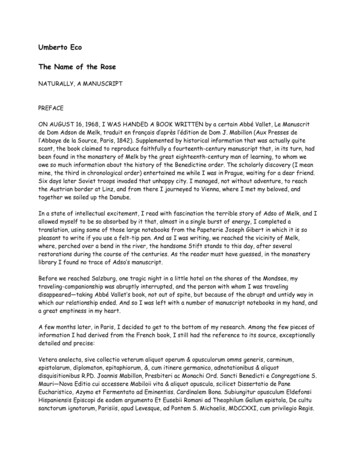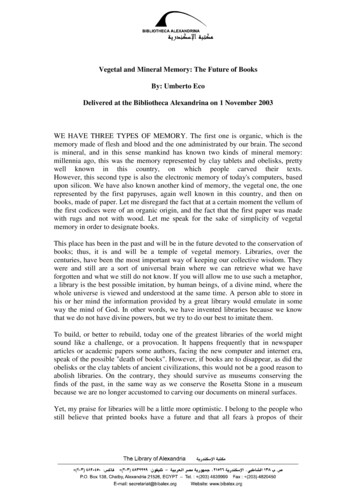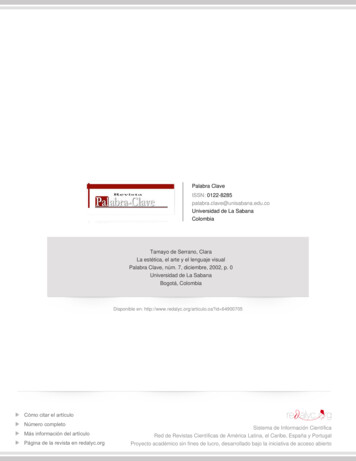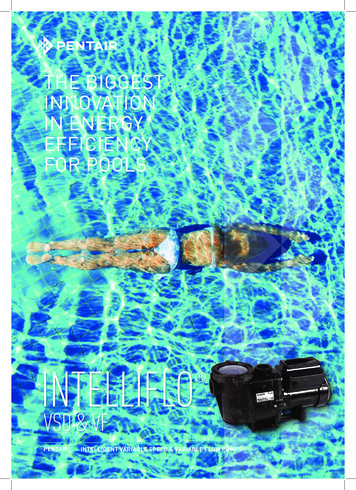
Transcription
Umberto EcoThe Name of the RoseNATURALLY, A MANUSCRIPTPREFACEON AUGUST 16, 1968, I WAS HANDED A BOOK WRITTEN by a certain Abbé Vallet, Le Manuscritde Dom Adson de Melk, traduit en français d’après l’édition de Dom J. Mabillon (Aux Presses del’Abbaye de la Source, Paris, 1842). Supplemented by historical information that was actually quitescant, the book claimed to reproduce faithfully a fourteenth-century manuscript that, in its turn, hadbeen found in the monastery of Melk by the great eighteenth-century man of learning, to whom weowe so much information about the history of the Benedictine order. The scholarly discovery (I meanmine, the third in chronological order) entertained me while I was in Prague, waiting for a dear friend.Six days later Soviet troops invaded that unhappy city. I managed, not without adventure, to reachthe Austrian border at Linz, and from there I journeyed to Vienna, where I met my beloved, andtogether we sailed up the Danube.In a state of intellectual excitement, I read with fascination the terrible story of Adso of Melk, and Iallowed myself to be so absorbed by it that, almost in a single burst of energy, I completed atranslation, using some of those large notebooks from the Papeterie Joseph Gibert in which it is sopleasant to write if you use a felt-tip pen. And as I was writing, we reached the vicinity of Melk,where, perched over a bend in the river, the handsome Stift stands to this day, after severalrestorations during the course of the centuries. As the reader must have guessed, in the monasterylibrary I found no trace of Adso’s manuscript.Before we reached Salzburg, one tragic night in a little hotel on the shores of the Mondsee, mytraveling-companionship was abruptly interrupted, and the person with whom I was travelingdisappeared—taking Abbé Vallet’s book, not out of spite, but because of the abrupt and untidy way inwhich our relationship ended. And so I was left with a number of manuscript notebooks in my hand, anda great emptiness in my heart.A few months later, in Paris, I decided to get to the bottom of my research. Among the few pieces ofinformation I had derived from the French book, I still had the reference to its source, exceptionallydetailed and precise:Vetera analecta, sive collectio veterum aliquot operum & opusculorum omms generis, carminum,epistolarum, diplomaton, epitaphiorum, &, cum itinere germanico, adnotationibus & aliquotdisquisitionibus R.PD. Joannis Mabillon, Presbiteri ac Monachi Ord. Sancti Benedicti e Congregatione S.Mauri—Nova Editio cui accessere Mabiloii vita & aliquot opuscula, scilicet Dissertatio de PaneEucharistico, Azymo et Fermentato ad Eminentiss. Cardinalem Bona. Subiungitur opusculum EldefonsiHispaniensis Episcopi de eodem argumento Et Eusebii Romani ad Theophilum Gallum epistola, De cultusanctorum ignotorum, Parisiis, apud Levesque, ad Pontem S. Michaelis, MDCCXXI, cum privilegio Regis.
I quickly found the Vetera analecta at the Bibliothèque Sainte Geneviève, but to my great surprise theedition I came upon differed from the description in two details: first, the publisher, who was givenhere as “Montalant, ad Ripam P.P. Augustinianorum (prope Pontem S. Michaelis),” and also the date,which was two years later. I needn’t add that these analecta did not comprehend any manuscript ofAdso or Adson of Melk; on the contrary, as anyone interested can check, they are a collection of briefor medium-length texts, whereas the story transcribed by Vallet ran to several hundred pages. At thesame time, I consulted illustrious medievalists such as the dear and unforgettable Étienne Gilson, butit was evident that the only Vetera analecta were those I had seen at Sainte Geneviève. A quick tripto the Abbaye de la Source, in the vicinity of Passy, and a conversation with my friend Dom ArneLahnestedt further convinced me that no Abbé Vallet had published books on the abbey’s presses (forthat matter, nonexistent). French scholars are notoriously careless about furnishing reliablebibliographical information, but this case went beyond all reasonable pessimism. I began to think I hadencountered a forgery. By now the Vallet volume itself could not be recovered (or at least I didn’tdare go and ask it back from the person who had taken it from me). I had only my notes left, and I wasbeginning to have doubts about them.There are magic moments, involving great physical fatigue and intense motor excitement, that producevisions of people known in the past (“en me retraçant ces détails, j’en suis à me demander s’ils sontréels, ou bien si je les ai rêvés”). As I learned later from the delightful little book of the Abbé deBucquoy, there are also visions of books as yet unwritten.If something new had not occurred, I would still be wondering where the story of Adso of Melkoriginated; but then, in 1970, in Buenos Aires, as I was browsing among the shelves of a littleantiquarian bookseller on Corrientes, not far from the more illustrious Patio del Tango of that greatstreet, I came upon the Castilian version of a little work by Milo Temesvar, On the Use of Mirrors inthe Game of Chess. It was an Italian translation of the original, which, now impossible to find, was inGeorgian (Tbilisi, 1934); and here, to my great surprise, I read copious quotations from Adso’smanuscript, though the source was neither Vallet nor Mabillon; it was Father Athanasius Kircher (butwhich work?). A scholar—whom I prefer not to name—later assured me that (and he quoted indexesfrom memory) the great Jesuit never mentioned Adso of Melk. But Temesvar’s pages were before myeyes, and the episodes he cited were the same as those of the Vallet manuscript (the description ofthe labyrinth in particular left no room for doubt).I concluded that Adso’s memoirs appropriately share the nature of the events he narrates: shroudedin many, shadowy mysteries, beginning with the identity of the author and ending with the abbey’slocation, about which Adso is stubbornly, scrupulously silent. Conjecture allows us to designate a vaguearea between Pomposa and Conques, with reasonable likelihood that the community was somewherealong the central ridge of the Apennines, between Piedmont, Liguria, and France. As for the period inwhich the events described take place, we are at the end of November 1327; the date of the author’swriting, on the other hand, is uncertain. Inasmuch as he describes himself as a novice in 1327 and sayshe is close to death as he writes his memoirs, we can calculate roughly that the manuscript waswritten in the last or next-to-last decade of the fourteenth century.
On sober reflection, I find few reasons for publishing my Italian version of an obscure, neo-GothicFrench version of a seventeenth-century Latin edition of a work written in Latin by a German monktoward the end of the fourteenth century.First of all, what style should I employ? The temptation to follow Italian models of the period had tobe rejected as totally unjustified: not only does Adso write in Latin, but it is also clear from the wholedevelopment of the text that his culture (or the culture of the abbey, which clearly influences him)dates back even further; it is manifestly a summation, over several centuries, of learning and stylisticquirks that can be linked with the late-medieval Latin tradition. Adso thinks and writes like a monkwho has remained impervious to the revolution of the vernacular, still bound to the pages housed in thelibrary he tells about, educated on patristic-scholastic texts; and his story (apart from thefourteenth-century references and events, which Adso reports with countless perplexities and alwaysby hearsay) could have been written, as far as the language and the learned quotations go, in thetwelfth or thirteenth century.On the other hand, there is no doubt that, in translating Adso’s Latin into his own neo-Gothic French,Vallet took some liberties, and not only stylistic liberties. For example, the characters speaksometimes of the properties of herbs, clearly referring to the book of secrets attributed to AlbertusMagnus, which underwent countless revisions over the centuries. It is certain that Adso knew thework, but the fact remains that passages he quotes from it echo too literally both formulas ofParacelsus and obvious interpolations from an edition of Albertus unquestionably dating from theTudor period.[1] However, I discovered later that during the time when Vallet was transcribing (?) themanuscript of Adso, there was circulating in Paris an eighteenth century edition of the Grand and thePetit Albert,[2] now irreparably corrupt. In any case, how could I be sure that the text known to Adsoor the monks whose discussions he recorded did not also contain, among glosses, scholia, and variousappendices, annotations that would go on to enrich subsequent scholarship?Finally, was I to retain in Latin the passages that Abbé Vallet himself did not feel it opportune totranslate, perhaps to preserve the ambience of the period? There were no particular reasons to do so,except a perhaps misplaced sense of fidelity to my source. . I have eliminated excesses, but I haveretained a certain amount. And I fear that I have imitated those bad novelists who, introducing aFrench character, make him exclaim “Parbleu!” and “La femme, ah! la femme!”In short, I am full of doubts. I really don’t know why I have decided to pluck up my courage andpresent, as if it were authentic, the manuscript of Adso of Melk. Let us say it is an act of love. Or, ifyou like, a way of ridding myself of numerous, persistent obsessions.I transcribe my text with no concern for timeliness. In the years when I discovered the Abbé Valletvolume, there was a widespread conviction that one should write only out of a commitment to thepresent, in order to change the world. Now, after ten years or more, the man of letters (restored tohis loftiest dignity) can happily write out of pure love of writing. And so I now feel free to tell, forsheer narrative pleasure, the story of Adso of Melk, and I am comforted and consoled in finding itimmeasurably remote in time (now that the waking of reason has dispelled all the monsters that itssleep had generated), gloriously lacking in any relevance for our day, atemporally alien to our hopes andour certainties.
For it is a tale of books, not of everyday worries, and reading it can lead us to recite, with à Kempis,the great imitator: “In omnibus requiem quaesivi, et nusquam inveni nisi in angulo cum libro.”January 5, 1980[1] Liber aggregationis seu liber secretorum Alberti Magni, Londinium, juxta pontem qui vulgariterdicitur Flete brigge, MCCCCLXXXV.[2] Les Admirables Secrets d’Albert le Grand, A Lyon, Chez les Héritiers Beringos, Fratres, àl’Enseigne d’Agrippa, MDCCLXXV; Secrets merveilleux de la magie naturelle et cabalistique du PetitAlbert, A Lyon, Chez les Héritiers Beringos, Fratres, à l’Enseigne d’Agrippa, MDCCXXIX.NOTEADSO’S MANUSCRIPT IS DIVIDED INTO SEVEN DAYS, AND each day into periods correspondingto the liturgical hours. The subtitles, in the third person, were probably added by Vallet. But sincethey are helpful in orienting the reader, and since this usage is also not unknown to much of thevernacular literature of the period, I did not feel it necessary to eliminate them.Adso’s references to the canonical hours caused me some puzzlement, because their meaning variedaccording to the place and the season; moreover, it is entirely probable that in the fourteenth centurythe instructions given by Saint Benedict in the Rule were not observed with absolute precision.Nevertheless, as a guide to the reader, the following schedule is, I believe, credible. It is partlydeduced from the text and partly based on a comparison of the original Rule with the description ofmonastic life given by Édouard Schneider in Les Heures bénédictines (Paris, Grasset, 1925).Matins - (which Adso sometimes refers to by the older expression “Vigiliae”) Between 2:30 and 3:00 inthe morning.Lauds - (which in the most ancient tradition were called “Matutini” or “Matins”) Between 5:00 and 6:00in the morning, in order to end at dawn.Prime - Around 7:30, shortly before daybreak. Terce Around 9:00.Sext - Noon (in a monastery where the monks did not work in the fields, it was also the hour of themidday meal in winter).Nones - Between 2:00 and 3:00 in the afternoon.Vespers - Around 4:30, at sunset (the Rule prescribes eating supper before dark).Compline - Around 6:00 (before 7:00, the monks go to bed).
The calculation is based on the fact that in northern Italy at the end of November, the sun risesaround 7:30 A.M. and sets around 4:40 P.M.PROLOGUEIn the beginning was the Word and the Word was with God, and the Word was God. This was beginningwith God and the duty of every faithful monk would be to repeat every day with chanting humility theone never-changing event whose incontrovertible truth can be asserted. But we see now through aglass darkly, and the truth, before it is revealed to all, face to face, we see in fragments (alas, howillegible) in the error of the world, so we must spell out its faithful signals even when they seemobscure to us and as if amalgamated with a will wholly bent on evil.Having reached the end of my poor sinner’s life, my hair now white, I grow old as the world does,waiting to be lost in the bottomless pit of silent and deserted divinity, sharing in the light of angelicintelligences; confined now with my heavy, ailing body in this cell in the dear monastery of Melk, Iprepare to leave on this parchment my testimony as to the wondrous and terrible events that Ihappened to observe in my youth, now repeating verbatim all I saw and heard, without venturing toseek a design, as if to leave to those who will come after (if the Antichrist has not come first) signsof signs, so that the prayer of deciphering may be exercised on them.May the Lord grant me the grace to be the transparent witness of the happenings that took place inthe abbey whose name it is only right and pious now to omit, toward the end of the year of our Lord1327, when the Emperor Louis came down into Italy to restore the dignity of the Holy Roman Empire,in keeping with the designs of the Almighty and to the confusion of the wicked usurper, simoniac, andheresiarch who in Avignon brought shame on the holy name of the apostle (I refer to the sinful soul ofJacques of Cahors, whom the impious revered as John XXII).Perhaps, to make more comprehensible the events in which I found myself involved, I should recallwhat was happening in those last years of the century, as I understood it then, living through it, andas I remember it now, complemented by other stories I heard afterward—if my memory still provescapable of connecting the threads of happenings so many and confused.In the early years of that century Pope Clement V had moved the apostolic seat to Avignon, leavingRome prey to the ambitions of the local overlords: and gradually the holy city of Christianity had beentransformed into a circus, or into a brothel, riven by the struggles among its leaders; though called arepublic, it was not one, and it was assailed by armed bands, subjected to violence and looting.Ecclesiastics, eluding secular jurisdiction, commanded groups of malefactors and robed, sword in hand,transgressing and organizing evil commerce. How was it possible to prevent the Caput Mundi frombecoming again, and rightly, the goal of the man who wanted to assume the crown of the Holy RomanEmpire and restore the dignity of that temporal dominion that had belonged to the Caesars?Thus in 1314 five German princes in Frankfurt elected Louis the Bavarian supreme ruler of the empire.But that same day, on the opposite shore of the Main, the Count Palatine of the Rhine and theArchbishop of Cologne elected Frederick of Austria to the same high rank. Two emperors for a singlethrone and a single pope for two: a situation that, truly, fomented great disorder. .
Two years later, in Avignon, the new Pope was elected, Jacques of Cahors, an old man of seventy-twowho took, as I have said, the name of John XXII, and heaven grant that no pontiff take again a namenow so distasteful to the righteous. A Frenchman, devoted to the King of France (the men of thatcorrupt land are always inclined to foster the interests of their own people, and are unable to lookupon the whole world as their spiritual home), he had supported Philip the Fair against the KnightsTemplars, whom the King accused (I believe unjustly) of the most shameful crimes so that he couldseize their possessions with the complicity of that renegade ecclesiastic.In 1322 Louis the Bavarian defeated his rival Frederick. Fearing a single emperor even more than hehad feared two, John excommunicated the victor, who in return denounced the Pope as a heretic. Imust also recall how, that very year, the chapter of the Franciscans was convened in Perugia, and theminister general, Michael of Cesena, accepting the entreaties of the Spirituals (of whom I will haveoccasion to speak), proclaimed as a matter of faith and doctrine the poverty of Christ, who, if heowned something with his apostles, possessed it only as usus facti. A worthy resolution, meant tosafeguard the virtue and purity of the order, it highly displeased the Pope, who perhaps discerned init a principle that would jeopardize the very claims that he, as head of the church, had made, denyingthe empire the right to elect bishops, and asserting on the contrary that the papal throne had theright to invest the emperor. Moved by these or other reasons, John condemned the Franciscanpropositions in 1323 with the decretal Cum inter nonnullos.It was at this point, I imagine, that Louis saw the Franciscans, now the Pope’s enemies, as his potentialallies. By affirming the poverty of Christ, they were somehow strengthening the ideas of the imperialtheologians, namely Marsilius of Padua and John of Jandun. And finally, not many months before theevents I am narrating, Louis came to an agreement with the defeated Frederick, descended into Italy,and was crowned in Milan.This was the situation when I—a young Benedictine novice in the monastery of Melk—was removedfrom the peace of the cloister by my father, fighting in Louis’s train, not least among his barons. Hethought it wise to take me with him so that I might know the wonders of Italy and be present whenthe Emperor was crowned in Rome. But the siege of Pisa then absorbed him in military concerns. Leftto myself, I roamed among the cities of Tuscany, partly out of idleness and partly out of a desire tolearn. But this undisciplined freedom, my parents thought, was not suitable for an adolescent devotedto a contemplative life. And on the advice of Marsilius, who had taken a liking to me, they decided toplace me under the direction of a learned Franciscan, Brother William of Baskerville, about toundertake a mission that would lead him to famous cities and ancient abbeys. Thus I became William’sscribe and disciple at the same time, nor did I ever regret it, because with him I was witness toevents worthy of being handed down, as I am now doing, to those who will come after us.I did not then know what Brother William was seeking, and to tell the truth, I still do not know today,and I presume he himself did not know, moved as he was solely by the desire for truth, and by thesuspicion—which I could see he always harbored—that the truth was not what was appearing to him atany given moment. And perhaps during those years he had been distracted from his beloved studies bysecular duties. The mission with which William had been charged remained unknown to me while wewere on our journey, or, rather, he never spoke to me about it. It was only by overhearing bits of hisconversations with the abbots of the monasteries where we stopped along the way that I formed some
idea of the nature of this assignment. But I did not understand it fully until we reached ourdestination, as I will tell presently. Our destination was to the north, but our journey did not follow astraight line, and we rested at various abbeys. Thus it happened that we turned westward when ourfinal goal was to the east, almost following the line of mountains that from Pisa leads in the directionof the pilgrim’s way to Santiago, pausing in a place which the terrible events that took place theredissuade me from identifying more closely now, but whose lords were liege to the empire, and wherethe abbots of our order, all in agreement, opposed the heretical, corrupt Pope. Our journey lasted twoweeks, amid various vicissitudes, and during that time I had the opportunity to know (never enough, Iremain convinced) my new master.In the pages to follow I shall not indulge in descriptions of persons—except when a facial expression,or a gesture, appears as a sign of a mute but eloquent language—because, as Boethius says, nothing ismore fleeting than external form, which withers and alters like the flowers of the field at theappearance of autumn; and what would be the point of saying today that the abbot Abo had a sterneye and pale cheeks, when by now he and those around him are dust and their bodies have the mortalgrayness of dust (only their souls, God grant, shining with a light that will never be extinguished)? ButI would like to describe William at least once, because his singular features struck me, and it ischaracteristic of the young to become bound to an older and wiser man not only by the spell of hiswords and the sharpness of his mind, but also by the superficial form of his body, which proves verydear, like the figure of a father, whose gestures we study and whose frowns, whose smile weobserve—without a shadow of lust to pollute this form (perhaps the only that is truly pure) of corporallove.In the past men were handsome and great (now they are children and dwarfs), but this is merely oneof the many facts that demonstrate the disaster of an aging world. The young no longer want to studyanything, learning is in decline, the whole world walks on its head, blind men lead others equally blindand cause them to plunge into the abyss, birds leave the nest before they can fly, the jackass playsthe lyre, oxen dance. Mary no longer loves the contemplative life and Martha no longer loves the activelife, Leah is sterile, Rachel has a carnal eye, Cato visits brothels, Lucretius becomes a woman.Everything is on the wrong path. In those days, thank God, I acquired from my master the desire tolearn and a sense of the straight way, which remains even when the path is tortuous.Brother William’s physical appearance was at that time such as to attract the attention of the mostinattentive observer. His height surpassed that of a normal man and he was so thin that he seemedstill taller. His eyes were sharp and penetrating; his thin and slightly beaky nose gave his countenancethe expression of a man on the lookout, save in certain moments of sluggishness of which I shall speak.His chin also denoted a firm will, though the long face covered with freckles—such as I often sawamong those born between Hibernia and Northumbria—could occasionally express hesitation andpuzzlement. In time I realized that what seemed a lack of confidence was only curiosity, but at thebeginning I knew little of this virtue, which I thought, rather, a passion of the covetous spirit. Ibelieved instead that the rational spirit should not indulge such passion, but feed only on the Truth,which (I thought) one knows from the outset.Boy that I was, I was first, and most deeply, struck by some clumps of yellowish hair that protrudedfrom his ears, and by his thick blond eyebrows. He had perhaps seen fifty springs and was thereforealready very old, but his tireless body moved with an agility I myself often lacked. His energy seemed
inexhaustible when a burst of activity overwhelmed him. But from time to time, as if his vital spirithad something of the crayfish, he moved backward in moments of inertia, and I watched him lie forhours on my pallet in my cell, uttering barely a few monosyllables, without contracting a single muscleof his face. On those occasions a vacant, absent expression appeared in his eyes, and I would havesuspected he was in the power of some vegetal substance capable of producing visions if the obvioustemperance of his life had not led me to reject this thought. I will not deny, however, that in thecourse of the journey, he sometimes stopped at the edge of a meadow, at the entrance to a forest, togather some herb (always the same one, I believe): and he would then chew it with an absorbed look.He kept some of it with him, and ate it in the moments of greatest tension (and we had a number ofthem at the abbey!). Once, when I asked him what it was, he said laughing that a good Christian cansometimes learn also from the infidels, and when I asked him to let me taste it, he replied that herbsthat are good for an old Franciscan are not good for a young Benedictine.During our time together we did not have occasion to lead a very regular life: even at the abbey weremained up at night and collapsed wearily during the day, nor did we take part regularly in the holyoffices. On our journey, however, he seldom stayed awake after compline, and his habits were frugal.Sometimes, also at the abbey, he would spend the whole day walking in the vegetable garden,examining the plants as if they were chrysoprases or emeralds; and I saw him roaming about thetreasure crypt, looking at a coffer studded with emeralds and chrysoprases as if it were a clump ofthorn apple. At other times he would pass an entire day in the great hall of the library, leafing throughmanuscripts as if seeking nothing but his own enjoyment (while, around us, the corpses of monks,horribly murdered, were multiplying). One day I found him strolling in the flower garden without anyapparent aim, as if he did not have to account to God for his works. In my order they had taught mequite a different way of expending my time, and I said so to him. And he answered that the beauty ofthe cosmos derives not only from unity in variety, but also from variety in unity. This seemed to me ananswer dictated by crude common sense, but I learned subsequently that the men of his land oftendefine things in ways in which it seems that the enlightening power of reason has scant function.During our period at the abbey his hands were always covered with the dust of books, the gold of stillfresh illumination, or with yellowish substances he touched in Severinus’s infirmary. He seemed unableto think save with his hands, an attribute I considered then worthier of a mechanic: but even when hishands touched the most fragile things, such as certain freshly illuminated codices, or pages worn bytime and friable as unleavened bread, he possessed, it seemed to me, an extraordinarily delicatetouch, the same that he used in handling his machines. I will tell, in fact, how this strange man carriedwith him, in his bag, instruments that I had never seen before then, which he called his wondrousmachines. Machines, he said, are an effect of art, which is nature’s ape, and they reproduce not itsforms but the operation itself. He explained to me thus the wonders of the clock, the astrolabe, andthe magnet. But at the beginning I feared it was witchcraft, and I pretended to sleep on certain clearnights when he (with a strange triangle in his hand) stood watching the stars. The Franciscans I hadknown in Italy and in my own land were simple men, often illiterate, and I expressed to him myamazement at his learning. But he said to me, smiling, that the Franciscans of his island were cast inanother mold: “Roger Bacon, whom I venerate as my master, teaches that the divine plan will one dayencompass the science of machines, which is natural and healthy magic. And one day it will be possible,by exploiting the power of nature, to create instruments of navigation by which ships will proceedunico homine regente, and far more rapid than those propelled by sails or oars; and there will be selfpropelled wagons ‘and flying apparatuses of such form that a man seated in them, by turning a device,
can flap artificial wings, ad modum avis volantis. And tiny instruments will lift huge weights andvehicles will allow travel on the bottom of the sea.”When I asked him where these machines were, he told me that they had already been made in ancienttimes, and some even in our own time: “Except the flying instrument, which I have never seen or knownanyone who has seen,. but I know of a learned man who has conceived it. And bridges can be builtacross rivers without columns or other support, and other unheard-of machines are possible. But youmust not worry if they do not yet exist, because that does not mean they will not exist later. And Isay to you that God wishes them to be, and certainly they already are in His mind, even if my friendfrom Occam denies that ideas exist in such a way; and I do not say this because we can determine thedivine nature but precisely because we cannot set any limit to it.” Nor was this the only contradictoryproposition I heard him utter; but even now, when I am old and wiser than I was then, I have notcompletely understood how he could have such faith in his friend from Occam and at the same timeswear by the words of Bacon, as he was accustomed to doing. It is also true that in those dark times awise man had to believe things that were in contradiction among themselves.There, of Brother William I have perhaps said things without sense, as if to collect from the verybeginning the disjointed impressions of him that I had then. Who he was, and what he was doing, mygood reader, you will perhaps deduce better from the actions he performed in the days we spent inthe abbey. Nor do I promise you an accomplished design, but, rather, a tale of events (those, yes)wondrous and awful.And so, after I had come to know my master day by day, and spent the many hours of our jo
The Name of the Rose NATURALLY, A MANUSCRIPT PREFACE ON AUGUST 16, 1968, I WAS HANDED A BOOK WRITTEN by a certain Abbé Vallet, Le Manuscrit de Dom Adson de Melk, traduit en français d'après l'édition de Dom J. Mabillon (Aux Presses de l'Abbaye de la Source, Paris, 1842). Supplemented by historical information that was actually quite










